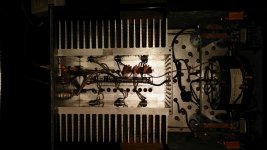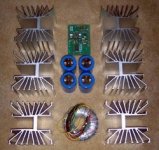Hey, I brought up this thread again. I deserve some answers! 😎
Where do I get those blue panasonics? And are they super-tiny?
Where do I get those blue panasonics? And are they super-tiny?
Thanks. How many watts do they need to handle?
And how huge must my heatsinks be? Everyone goes on and on that you need these huge sinks, but how many c/w do I need?
I really want to have someone qualified for the job to do the semiconductor measuring..
And how huge must my heatsinks be? Everyone goes on and on that you need these huge sinks, but how many c/w do I need?
I really want to have someone qualified for the job to do the semiconductor measuring..
EsE said:..............
I really want to have someone qualified for the job to do the semiconductor measuring..
search in Market Place and Electronics & Parts subforums ;
you'll find recent trades for matched mosfets
EsE said:How many watts do they need to handle?
And how huge must my heatsinks be? Everyone goes on and on that you need these huge sinks, but how many c/w do I need?
I understand you are building Aleph 30.
Use 3W size, or bigger if you want, for 0.47 ohm resistors--any make, any type. Use 1/4W size, or greater if you want, for all other resistors--any make, 1% metal film type.
Each Mosfet of Aleph 30 dissipates heat about 13 watts. Meanwhile, Papa always recommends heat sink temperature rise of 25 deg C above room temperature (so, heat sink of 50 deg C with room temp of 25 deg C). This means that you need heat sinks having thermal resistance less than 25/13/1= 1.9C/W when you attach only one Mosfet on the sink. If you plan to attach two Mosfets on one sink, less than 25/13/2= 0.95C/W. If three Mosfets, then 25/13/3= 0.64C/W . . . I believe you could do better calculation than me . . .

EsE said:How many watts do they need to handle? And how huge must my heatsinks be? Everyone goes on and on that you need these huge sinks, but how many c/w do I need?
The resistors are 3W, which is plenty. Most of the time they
dissipate less than a watt.
The heat sinks should be adequate to hold the temperature
to about 25 deg C above ambient. Loosely figure that the
dissipation of an Aleph is 3 times the output rating and you
can derive a c/w figure
W = watts
Rth = 25 / 3 / W
So for a 50 watt Aleph, you want 25/150 = .16 deg / watt

Nelson Pass said:What I would like to see is some nice 10 uF silver micas
I've had that line in my head all day, from the mall to the beach, so here goes : for which purpose ?
With a bit of luck and patience, good and cheap applies in particular for diy.
By chance, while shopping for other parts i stumbled on something better than silver mica a few weeks ago, an estimated 50 to 60uF.
Downside, it's 8500 pieces in a 34 value range.
I was thinking of assembling a few 1uF superduper caps with them, for the biggest cap size of the lot i'd have to put about 125 in parallel.
Mr. Pass , 10 uF Micas are no problem ,
see www.thel.de in the midst under
Bauelemente (Parts) , than on the left handside
there are Micas
Greetings from Germany
Jürgen
see www.thel.de in the midst under
Bauelemente (Parts) , than on the left handside
there are Micas
Greetings from Germany
Jürgen
Mr. Pass , 10 uF Micas are no problem, see www.thel.de in ...
The text says they are custom made by Cornell Dubilier in the US.
Martin,
the text also mentions they're not conventional silver micas, but a mixture of grinded mica, polymeres and aluminium foil.
the text also mentions they're not conventional silver micas, but a mixture of grinded mica, polymeres and aluminium foil.
Jacco,
you are right, since I'm suffering from low attention span syndrome I did not read everything: ground mica & polymer pressed into thin layers, and aluminium foil which they say is conducting much better than a thin silver film! Obviously Thel claims them to be superb, which they better be considering their prohibitive price.
Btw., not everybody seems to be in favour of Mica caps, they have a fairly high DA and some claim they find their sound annoying.
Actually I believe Nelson is on the phone with Cornell Dubilier "as we speak" so we may find out pretty soon how good they really are 😎
you are right, since I'm suffering from low attention span syndrome I did not read everything: ground mica & polymer pressed into thin layers, and aluminium foil which they say is conducting much better than a thin silver film! Obviously Thel claims them to be superb, which they better be considering their prohibitive price.
Btw., not everybody seems to be in favour of Mica caps, they have a fairly high DA and some claim they find their sound annoying.
Actually I believe Nelson is on the phone with Cornell Dubilier "as we speak" so we may find out pretty soon how good they really are 😎
hello to all.
not able to find the answer, i'll ask the question.
the R19 you are all talking about, what resistor would that be on the boards from Kristijan Kljucaric?
i know i have plenty of heatsink as my amps stay at about ambient.
not able to find the answer, i'll ask the question.
the R19 you are all talking about, what resistor would that be on the boards from Kristijan Kljucaric?
i know i have plenty of heatsink as my amps stay at about ambient.
Thnx zen mod.
That would suggest that i need the 221k resistor or R17 on my KK pcb.
Starting with a trim pot of 200k should do the trick.
That would suggest that i need the 221k resistor or R17 on my KK pcb.
Starting with a trim pot of 200k should do the trick.
Yes, I pulled it out of my Aleph 2's many years ago. Full blast they bias at 4 amps and they sound incredible. Be sure you have adaquate heatsinking though as temperature is inversely proportionate to bias current. Aleph 2 is normally ~3 amps bias and runs hot. When you go to 4 amps is going to be blazing hot. I over heatsinked mine when I built them so no issues. They have been running this way for 12 years!
You can also install potentiometer in there and dial it to your liking and also to safe temperature.
You can also install potentiometer in there and dial it to your liking and also to safe temperature.
Last edited:
- Status
- Not open for further replies.
- Home
- Amplifiers
- Pass Labs
- Top ten ways to a better Aleph?


